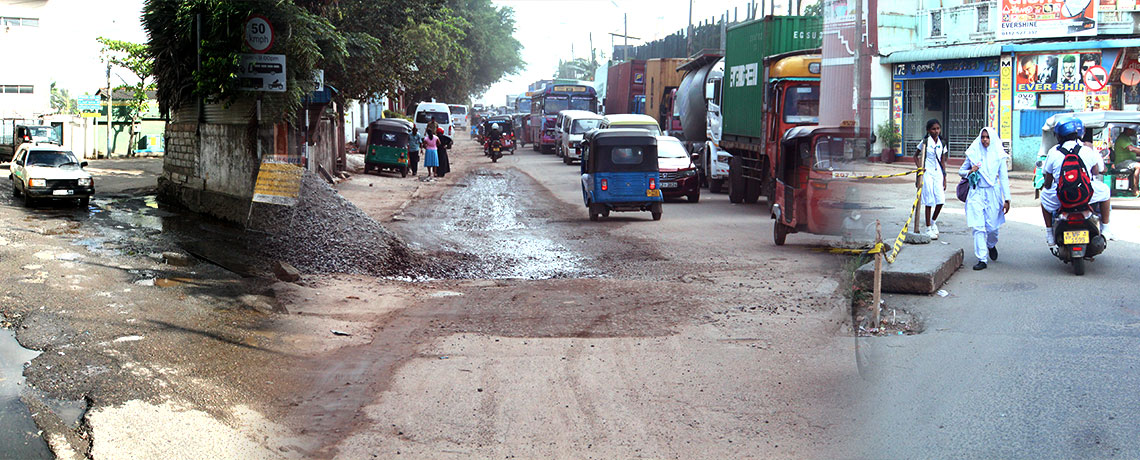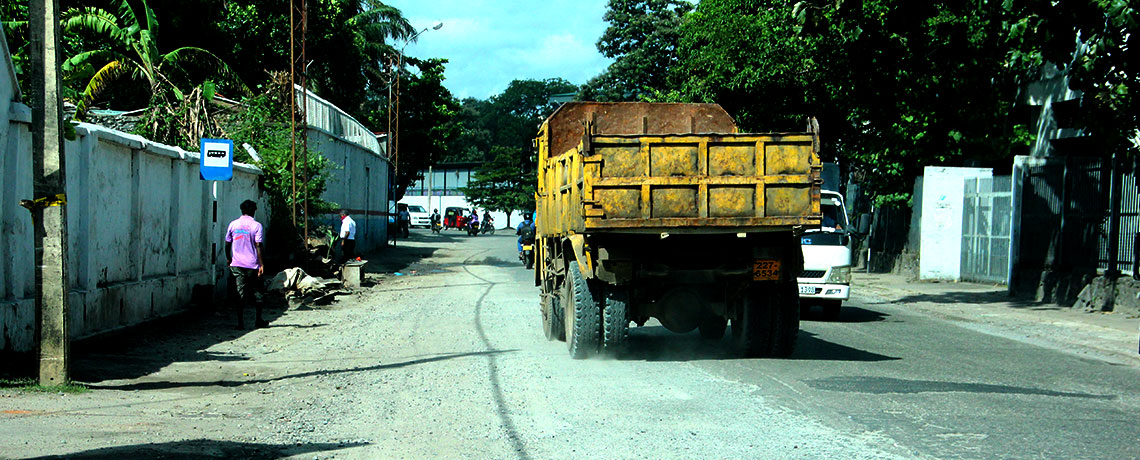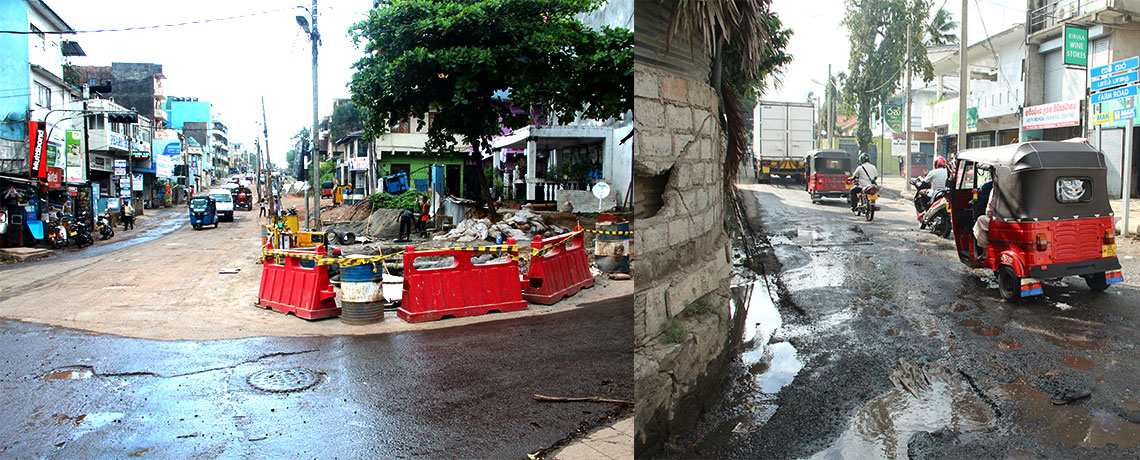16 Nov 2017 - {{hitsCtrl.values.hits}}

Road conditions in many areas of Sri Lanka are nothing to brag about, screaming for much improvement. Being Sri Lankans, we’ve all experienced the ‘bumpy rides’ where vehicles drive over the potholes during which the person in the non-driving seat inconveniently hugs the dashboard. But, today’s focus isn’t on the ‘natural’ wear and tear of roads, but on ‘man made’ damage to roads.
 Over the past few months, there were numerous complaints regarding the recurrence of excavations where roads have been damaged as a result. These damages to the roads made the do a tour around and about the Colombo areas. Judging by the nature of the reconstruction of roads, it was clear that there was a lack of co-ordination between the state institutions that conduct road excavations. The public seem to be inconvenienced by the recurring road constructions. Some hinted at the presence of the possibility of a road mafia. Could the lack of co-ordination between these institutions be intentional or boil down to negligence?
Over the past few months, there were numerous complaints regarding the recurrence of excavations where roads have been damaged as a result. These damages to the roads made the do a tour around and about the Colombo areas. Judging by the nature of the reconstruction of roads, it was clear that there was a lack of co-ordination between the state institutions that conduct road excavations. The public seem to be inconvenienced by the recurring road constructions. Some hinted at the presence of the possibility of a road mafia. Could the lack of co-ordination between these institutions be intentional or boil down to negligence?
Not only did the condition of these roads affect the morning and evening traffic, which was already frustrating, there were consequences too. The reconstructed roads were uneven and of a lower quality compared to roads in other areas. In addition to these woes, there have been instances where the excavation process has damaged nearby property. Therefore, the decided to ‘dig up’ more information about these ‘man-made pits’.
The reconstructed roads were uneven and of a lower quality compared to roads in other areas. In addition to these woes, there have been instances where the excavation process has damaged nearby property
How do these ‘pits’ affect you?
A country’s road system is a crucial aspect of its development process. A road is essential to travel on, but the more time a citizen spends on the road, the less productive the country becomes. The Oxford Dictionary defines man-hour as ‘An hour regarded in terms of the amount of work that can be done by one person within this period’. Millions of these man hours are lost to the country in term of workforce per year due to the time spent on the roads unnecessarily. In order to spend less time on the road, as well as to prevent many avoidable accidents, due to less than ideal road conditions, it’s essential that the roads in the country are maintained in pristine condition.
Road construction work also poses fatal threats which lead to road accidents. One such example is the incident that occurred a few months ago in Nugegoda, where a partially closed road resulted in a collision of vehicles. Stanley Thilakaratna Mawatha was the location of an accident where two motorcycles collided. Part of the road had been excavated to mend a leaking pipe.

However, because the excavated part of the road wasn’t repaired perfectly it paved the way for the accident, involving the motorcyclists. Businessmen in the vicinity voiced their protests that even previously too such accidents had occurred at the same place. The said that these accidents had happened due to the improper and incomplete construction of the road. Even when requests were made from relevant officials for the completion of the road constructions there was no response.
Road construction is a costly procedure carried out using public money. Each time a road is broken and reconstructed, a large sum of money is spent. Is this always done out of necessity? Residents complained that a particular place on the road leading to Braybrooke Place was dug up thrice during the past three months. Isn’t there a procedure that makes the institutions managing water, electricity and telecommunications to carry out their construction work before a road is newly carpeted?
We’ve received complaints of damage to private property as a result of roads being dug up. Vipulasena Mawatha residents had to wait one year before receiving compensation for the damage done to their properties due to the laying out of a drainage system.
What’s the correct procedure?
Jayantha Guruge Former CMC Advertorial Committee Chairman when contacted said that digging up of a road might happen either due to the need of an individual, as in the case of installing a line for water supply to a house, or organization. Guruge said that excavation on a road can be done to install or repair lines that supply water or electricity, such lines often being placed beneath the middle of the road. In either instance, depending on whether the roads concerned belong to the Colombo Municiple Council (CMC) or the Road Development Authority (RDA), one has to obtain permission from the respective authorities.
After an application is submitted, the area is inspected by a CMC officer who then provides an estimate. This estimate provides details of the cost of the total operation, including re-tarring or carpeting. After the road is dug up and construction concludes the contractors from the organization backfill the hole with CMC approved material. Following backfill, the CMC reconstructs the road. If the backfill doesn’t meet the standard, the contractors are forced to relay the road. “These initial measures don’t guarantee 100% quality as before. After about 3 months the road is scraped using a mining machine and then re-carpeted using a paver,” he explained.
Road construction is a costly procedure carried out using public money. Each time a road is broken and reconstructed, a large sum of money is spent. Is this always done out of necessity?
A panorama of perspectives
When inquired about the delay in repairing damages to roads by organizations like The Water Board and Electricity Board, RDA Chairman Nihal Ranjith Sooriyaarachchi stated that these organizations are supposed to repair the roads under the supervision of the RDA. “But sometimes, as with The Water Board, they can’t identify the leak immediately because the pipelines are situated underground. Therefore they leave the site without repairing. When there is lack of staff and when a bigger project is undertaken, they leave the site in the present condition. This is the development that led to the incident at Staney Thilakaratne Mawatha,” he added.

“They have to operate on a trial and error basis when dealing with old pipelines. We understand that the damage done to multiple sites and the lack of staff are inevitable. Even though we have heavily cautioned workers to take safety measures, such putting up barriers or installing lights, these instructions aren’t always followed by these organizations,” he further stated.
Minimising inconvenience
When inquired about the slow progress at the sites dug up by The Water Board, the spokesperson explained that the construction is usually done during the night. He said that this time is used to minimise the inconvenience caused to the public. However, he said that the times might change if the project is huge. “But in the instance when the electricity or telecommunication lines are harmed, while digging up the roads, the respective institution is informed and the pit is left for them to work on. During such instances there might be a delay which in turn inconveniences the public,” the spokesperson said.
When inquired about complaints regarding the repeated opening up of roads at the same place, following reconstruction, he responded by saying that following repairs the roads are closed to check the pressure in the water pipes. “If something goes wrong then these sites have to be opened up again and again due to the out dated technology that’s being used. But a project is being carried out these days to replace the pipes using a new technology,” he said.
No delays
The Water Board alleged that while it is engaged in the process of fixing pipelines after roads are dug up, electricity lines sometimes get damaged. A spokesperson from The Water Board said that workmen from his institution remain until representatives of the Electricity Board arrive to fix the damaged lines, so that they can finish their work. When inquiries were made from the Electricity Board, regarding this issue, it responded by stating that the damage to electricity lines are generally reported and that they set out to fix the lines right away without delaying.
When inquired whether the Electricity Board initiates road excavations to fix or extend electricity lines and whether it supervises the reconstruction work of roads fixed, a CEB engineer said, “If we want to dig up the roads, we obtain permission from the CMC. We make a payment and obtain a permit. But once the lines are subject to alterations, the CMC is informed and thereafter the tarring and carpeting of the roads are done by the CMC”.
Sudden increase of construction sites
During the Daily Mirror investigations it was unearthed that the ongoing Colombo Water Supply Service Improvement Project, aimed at replacing the underground water pipes (most which are over a century old) supplying the Colombo city, is linked with much of the construction sites on the roads. This project aims at minimizing water loss, which is currently close to 33% of the total water supply. The authorities also plan to use the project to replace 60% of the pipelines with computerized pipelines. The Daily Mirror spoke to the Project Director, about the inconvenience caused to the public as a result of the project.
He revealed that reconstruction of these roads is done by the contractors of the Water Board, with the conference of the CMC and the Traffic Police. He further stated that the project is expected to continue until 2021 due to certain difficulties present in carrying out the repairs. “Our task has been made more difficult because much of the water system is located underground and isn’t properly mapped, with the electricity and telecommunication services overlapping at times. In order to minimize the disturbances to the public much of the construction is carried out at night,” he further stated. “With the new digital water system, which uses high quality pipes, we can expect an improved water supply along with minimal damage to roads,” he concluded.
Root of the problem
According to Member of Parliament, Colombo Municipal Councillor and JVP member Hemantha Weerakoon, even when a person requests for a new water supply, this individual has to pay the Water Board and the CMC for the damages done to the road. However, most of the time the reconstruction work isn’t done on time. Even when reconstruction is done on time there is a drop in quality. “One week after the reconstruction, there are giant ditches in the place that the repair was done,” he said.
When inquired about the reasons for these loopholes in the system, he said that it was due to the lack of a long term vision. He pointed out that the absence of coordination contributed hugely to this issue. “As a politician, I see that absence of a plan. Personally nor institutionally no one is willing to take responsibility regarding these issues. Nobody takes measures to resolve them either. People are concerned about themselves and the ultimate result is the waste of public money. There should be a long term vision and a plan of action and coordination between the Central Government and the Provincial Council,” he concluded
End of the road
Digging up roads to repair and expand the services running underground is a necessary and inevitable evil. But, it was evident from our inquiries that these projects aren’t carried out optimally, resulting in a considerable loss of public money and inconveniencing citizens. Lack of coordination between the respective institutions, being short of labour and the lack of a follow up procedure were some of the problems that the Daily Mirror identified with regards to the overall issue of road damage.
There are roads that need much improvement in the Colombo District. By using a sustainable long-term system and including all the organizations involved, the public money that’s wasted on digging up roads and refilling them could be used more productively, on the roads that actually need improvement.
The road construction conundrum in the country has created an eroteme with no proper answer to mark a full stop to the ongoing doubts that arise naturally. So taking the much talked about topic of ‘the road situation’ on to the ‘roads’ the obtained the views of the people.
The road named Vipulasena Mawatha, where Asoka College is located, also harboured a rocky stretch. Renovation work is visible only on one part of the avenue. In the middle of the construction chaos, we spoke to a few of the local residents.
‘We are greatly inconvenienced”
Henry Joseph (53) a local resident of Vipulasena Mawatha
 “Since last August they have been engaged in construction of this road, but still there’s no progress. Road construction was initiated by the Colombo Municipal Council (CMC) and work on the road took place according to the terms of a contract. At the time of the construction the walls of some houses in the neighbourhood cracked and collapsed. Since then the construction of the road was aborted. Now they have just begun fixing the damage.
“Since last August they have been engaged in construction of this road, but still there’s no progress. Road construction was initiated by the Colombo Municipal Council (CMC) and work on the road took place according to the terms of a contract. At the time of the construction the walls of some houses in the neighbourhood cracked and collapsed. Since then the construction of the road was aborted. Now they have just begun fixing the damage.
This damage was done right in front of a school, so it isn’t good for the neighbourhood and the school. Initially the construction on the road was commenced with the aim of draining out rain water that collects. They dug 10 feet underground to build a drainage system to avoid rain water from collecting. The CMC is halfway through the initiative and the roads are broken. They just start work and stop abruptly. They have now started fixing the damage. Must see what happens. But we have faced some losses,” said Joseph.
Another local resident of Vipulasena Mawatha, who spoke on terms of anonymity, expressing his views on the issue said, “For a period of one and a half years they have been fixing this road.”
 “Walls of neighbouring houses collapsed” - S.P.C. Kumarasinghe
“Walls of neighbouring houses collapsed” - S.P.C. Kumarasinghe
“The CMC is responsible for the road construction in the area, but at the time of excavating, the walls of the neighbouring houses collapsed. So construction has been put on hold until the damage is fixed,”said Kumarasinghe.
Investigating more roads in the Colombo area, the Daily Mirror observed that Braybrooke Road and some roads in the vicinity had uneven tarring. This condition was visible for miles which led us to believe that these roads had undergone some excavation as well.
Following are quotes from folks who frequent these roads.
 “Roads are in bad condition” - Wales Kumar (32)
“Roads are in bad condition” - Wales Kumar (32)
The conditions created by initiating road constructions cause damages to vehicle parts. I come from Wattala to Colombo and the roads are in bad condition. It’s hard on the vehicles when we drive on these roads.
 “Work is incomplete” - Sarath Gunasinghe (50)
“Work is incomplete” - Sarath Gunasinghe (50)
We can’t drive on these roads. The roads are broken and unevenly tarred. Roads dug across to make drains and work is incomplete. At one time they carpeted the roads, but the next they break the roads again. From the time I can remember this has been going on for a while. This road was very recently broken again.
 “Roads are dug up often” - W.K.R. Galappatti (47)
“Roads are dug up often” - W.K.R. Galappatti (47)
Drains are situated at uneven levels throughout the road. They are dangerous. Drains should be constructed at the same level. About two weeks ago, the road was dug up and workmen reasoned that it was to place some telephone lines.
Roads are dug up often after tarring and carpeting. They aren’t even fully completed before they return and break down the roads again.
“ We don’t benefit from any of this”
 Prabath Weerasinghe (41)
Prabath Weerasinghe (41)
“The RDA comes and constructs the roads. First of all what I can say is that they don’t have a strategic plan. There is no collaboration between the many sectors that are responsible for road construction. If they collaborated, the roads wouldn’t have had to be dug so often. First of all, a long-term strategic plan has to be made. But in reality they only plan for a few months and construct roads. Later they commence construction to widen the roads, so that two vehicles can pass each other.
They could have planned this before the initial construction of the road. Why are they doing this? Is it for commissions? But we don’t benefit by any of this. Three months ago they broke this road thrice. There was a time where they were excavating at the same spot for a week. They break the roads when they dig. After tarring and carpeting the roads, they break the roads again.
 “They construct halfway” Lalith Kumara (46)
“They construct halfway” Lalith Kumara (46)
“They construct halfway. Water also fills. It is hard to travel on the roads.”
23 Dec 2024 32 minute ago
23 Dec 2024 41 minute ago
23 Dec 2024 52 minute ago
23 Dec 2024 2 hours ago
23 Dec 2024 3 hours ago